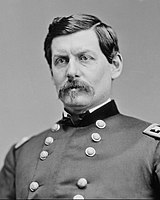| ||||||||||||||||||||||||||
| ||||||||||||||||||||||||||
 County Results
| ||||||||||||||||||||||||||
| ||||||||||||||||||||||||||
| Elections in Kansas |
|---|
 |
The 1864 United States presidential election in Kansas took place on November 8, 1864, as part of the 1864 United States presidential election. Kansas voters chose three representatives, or electors, to the Electoral College, who voted for president and vice president.
This was the first presidential election in which Kansas participated, following its admission as the 34th state on January 29, 1861. The National Union ticket of incumbent President Abraham Lincoln and Tennessee Governor Andrew Johnson defeated the Democratic ticket of former Commanding General of the United States Army George B. McClellan and U.S. Representative George H. Pendleton and carried Kansas's three electoral votes. Lincoln and Johnson carried the state by a landslide margin of 63%.
With more than 81% of the popular vote, Lincoln's victory in the state was his strongest victory in the country in terms of his share of the popular vote, and the strongest performance by any presidential candidate in Kansas.[1]
In addition to the votes cast for the regular electoral tickets pledged to Lincoln and McClellan, 655 votes were cast for Ellsworth Cheeseborough[a] of Atchison County. Some tertiary sources, such as Dave Leip's Atlas of U.S. Presidential Elections, count these as votes for independent or write-in candidates.[2][b] In fact, Cheeseborough was an elector nominated on the National Union ticket who died prior to the election.[3][4] Nineteenth century election laws required voters to vote directly for members of the Electoral College, whose names appeared on tickets printed and circulated by the parties alongside the nominees for president and vice president.[5][6] This sometimes resulted in small differences in the number of votes cast for electors pledged to the same presidential candidate if some voters did not vote for all the electors nominated by a party, or if one or several electors were replaced close to the election.[7] Following Cheeseborough's death, the National Union Party substituted Thomas Moonlight and W. F. Cloud as candidates for the Electoral College from Kansas. (Nelson McCracken, the second elector on the National Union ticket, had also died in the interim.)[8][9] Nevertheless, Cheeseborough's name continued to appear on printed tickets as a National Union candidate for elector in the final days before the election.[10][11] A small number of tickets featuring Cheeseborough were cast, and these were counted separately from votes for the substitute National Union ticket.[12][13]
- ^ Leip, Dave. "1864 Presidential Election Statistics". Dave Leip’s Atlas of U.S. Presidential Elections. Retrieved March 5, 2018.
- ^ Leip, Dave. "1864 Presidential General Election Results - Kansas". Dave Leip's Atlas of U.S. Presidential Elections. Retrieved August 20, 2024.
- ^ Andreas, A. T. (1883). History of the State of Kansas. Chicago. p. 213.
{{cite book}}: CS1 maint: location missing publisher (link) - ^ "Republican Union State Ticket". White Cloud Kansas Chief. October 20, 1864.
- ^ Kansas (1863). "Election for Electors, and Amending an Act". General Laws of the State of Kansas [...] Lawrence. pp. 98–100.
{{cite book}}: CS1 maint: location missing publisher (link) - ^ The Presidential Counts: A Complete Official Record [...]. New York. 1877. p. 441.
One great objection to the present electoral system is that it absolutely circumscribes the power and the rights of the individual voter. He cannot now vote for the man of his choice for President, but must vote for electors.
{{cite book}}: CS1 maint: location missing publisher (link) - ^ Ratcliffe, Donald J. (Spring 2014). "Popular Preferences in the Presidential Election of 1824". Journal of the Early Republic. 34 (1): 57. JSTOR 24486931.
- ^ Andreas, 213.
- ^ "Regular Union Republican Ticket". Emporia News. November 5, 1864.
- ^ "Presidential Electors". Smoky Hill and Republican Union. October 29, 1864.
- ^ "For Presidential Electors". Big Blue Union. October 29, 1864.
- ^ Wilder, Daniel W. (1875). The Annals of Kansas. Topeka. pp. 389–90.
Abstract of the Soldier vote for Electors of President and Vice President [...] E. Cheeseborough, 543.
{{cite book}}: CS1 maint: location missing publisher (link) - ^ Admire, W. W. (1891). Admire's Political and Legislative Handbook for Kansas. Topeka. p. 224.
Abstract of the soldier vote for electors of president and vice president [...] E. Cheeseborough, 543.
{{cite book}}: CS1 maint: location missing publisher (link)
Cite error: There are <ref group=lower-alpha> tags or {{efn}} templates on this page, but the references will not show without a {{reflist|group=lower-alpha}} template or {{notelist}} template (see the help page).


